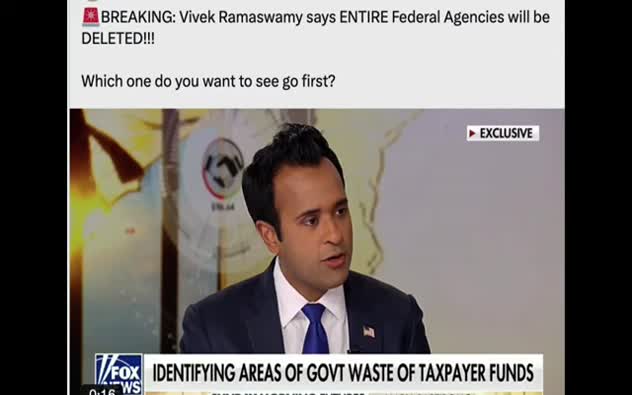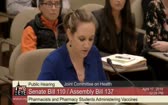Advertisement
Pharmacists to Administer Child Vaccines WI AB137 SB110
April 17 2019 Health Committee Hearing Judith Jolly RN testimony against
This bill eliminates any patient age restriction for the administration of a vaccine by a pharmacist if the vaccine is administered pursuant to the prescription order of a physician or other prescribing practitioner issued within the 29 days immediately preceding the day on which the vaccine is administered and the pharmacist has satisfied certain education requirements.
PASSAGE RECOMMENDED, Ayes 13, Noes 0
Bill text: https://docs.legis.wisconsin.gov/2019/related/proposals/ab137.pdf
- Category: Uncategorized,Vaccine / Mandatory Agenda
- Duration: 17:58
- Date: 2019-05-10 18:50:20
- Tags: wisconsin ab137, wisconsin sb110, vaccines
3 Comments
Video Transcript:
Good morning. I should actually say good afternoon and thank you for your time. My name is Judith Jolly and I'm a resident of Partiville, Wisconsin. I came out today to testify against Senate Bill 110 Assembly Bill 137. Current law allows children six years of age and older to be vaccinated by pharmacists. However, there is no language to ensure that an individual or parent receives informed consent. Under the National Childhood Vaccine Injury Act of 1986, vaccine providers are required by law to give a patient or legal representative their parent, appropriate vaccine information statement often known as this. Prior to each dose of vaccine, including each dose of a multi-dose series, regardless of a person's age. Again, there's no language in the current law or an SB 110 AB 137 of this legal requirement. This law only requires a 12-hour course of study and training approved by the accreditation council for pharmacy education or the pharmacy board. This legislature cannot just assume that pharmacists will be properly trained or that the board rules actually cover everything required under the National Childhood Vaccine Injury Act of 1986. There is no language in this bill requiring pharmacists to screen persons for allergies or contraindications to vaccination. Additionally, as the current law does not require pharmacists to maintain a health record on each person they vaccinate and no language in this bill requiring pharmacists to report adverse reactions to the child's doctor or even to the vaccine adverse events reporting system known as VAERS. As required by federal law, these reactions may go uncharted and unreported. Further, while this bill requires pharmacists to enter data into the Wisconsin immunization registry within seven days, it does not require pharmacists to double check the registry prior to vaccine administration. As a result, an infant or young child may be at risk of receiving unnecessary and potentially harm-and-gissing additional doses of vaccines. Unlike a child's health care provider, pharmacists do not have a complete health history on a child. They may not be fully aware of a child's medical history, allergies, or previous or history of previous vaccine reaction. This lack of knowledge can potentially place an infant or child at risk. Vaccination is a medical procedure that needs to be performed in an environment of privacy, and one where safety is a priority. Vaccination of a young child is not the same as vaccination of a fully informed and consenting adult or even older child. Vaccination sites for infants and young children differ from older children and adults, with the interior lateral five muscle considered the primary muscle of vaccine administration for most children under the age of two. As a result, clothing may need to be removed in order to safely vaccinate an infant or young child. Not all pharmacies are equipped with private rooms to ensure that a child's privacy is fully protected. Moreover, infants and children rarely sit still during invasive medical procedures such as vaccine administration, and without a designated room or additional staff to accommodate unique challenges involved in vaccinating infants and young children, this has significant potential to place a young child at a greater risk for injury. Should an infant or child develop an acute reaction following vaccination, additional trained medical staff and adequate life-saving medical equipment may not necessarily be readily available to a pharmacist or pharmacy student. I have personally witnessed an adult experience in immediate reaction following vaccination at a local pharmacy that required EMS response. I saw first-town how difficult and stressful the situation was for the pharmacist and staff, the vaccine recipient, and even concerned members of the general public who happen to be nearby. Adverse events following vaccination can and do occur, and in most instances there is no way to predict who will react when and how severely the reaction may be. As a result, vaccination of infants and young children must take place in a safe environment where there are sufficient number of trained health professionals close by to ensure that any adverse events are attended to promptly, to ensure the safety and well-being of the infant or child. Further, should an adverse event occur, details of the event can be recorded promptly in the child's medical record and reported to bears as required by law. Public pharmacies are not an appropriate or safe environment for the administration of vaccines to infants and young children, and I encourage you to vote no on SB 110, AB 137. Thank you for your time. Thank you. Any questions? Representative Colstie? This is not a question, but just a comment for your group that a couple of times you said that there is no screen for allergies and contraintacations, but this bill specifically says that there has to be a prescription and that that prescription would be from the physician or the provider of the child, so they should be absolutely if there is contraintacations or allergies that would be noted by the physician before you wrote the prescription. Right. But if you are a practicing provider with a license, you should be covering yourself and not just assuming that the physician is actually doing their jobs. And currently, there are many offices that medical offices that don't provide vaccines because they are very expensive and they get that through the county health departments, etc. And also, when you talk about concern about the information being put in the registry, that same would go for a physician's office too. They wouldn't if the father brought in a child. I mean, the physician wouldn't know any more than a pharmacy. I'm not following your question. You said that you're concerned that if because of the seven-day leg. No, I'm not concerned about the seven-day leg. What I'm concerned about is that vaccine providers and the pharmacies are not looking at the registry prior to administering a vaccine and double checking that record to see whether or not that child's actually had that vaccine and were double dosing. Okay. Representative Sue Beck. Thank you. And my question relates to testimony, but probably as directed to Legit, to Legit Council. We heard from this individual and from a couple other people have testified about the issue of informed consent. My experience when I got a flu shot at the pharmacy was they went through an informed consent procedure. I signed it. All of that. Is there, while I don't see anything in the text of what's right here today about informed consent, are there laws in place regarding immunizations and informed consent that would also apply to pharmacists that would ensure that people were indeed being given the information and consenting? Yes, still on informed consent is broader than just picking out immunizations, but it applies to healthcare providers and certainly would require broadly applies to healthcare providers and administering healthcare. And then of course parents have that informed consent rate generally speaking for children. So that has to be the informed consent has to the provider has to get that from the parent before doing the procedure. Okay, so that would apply here and informed consent would be required because it's already in current law that informed consent would be required for this activity. Thank you. Okay, any representative Murphy? Thank you, Mr. Chairman. Thank you, Mayor, for your testimony. I just need to revisit this whole issue of the no history, no health history on the child. So if the doctor is giving a prescription, if he has not checked the health history, I'm trying to figure out where in the process I'm going to fix this because if the child is in the doctor's office and he doesn't properly check the health history and first of all we talked before about doctors and nurses, I got to believe there's no doctor in the state of Wisconsin gives any vaccinations, whatsoever. So it's all nurses. So doctors are offloading this job to someone else in all these situations no matter what. So if they prescribe it to a pharmacist or they delegate it to a nurse, it was their job. I would assume to check the medical history. So I don't know how else to fix that. There still should be for pharmacists to administer, you would want to double check that. I know if I were and actually my background I am a registered nurse, I would not go ahead and give something without double checking myself because that's my nursing license. And I think that there should be language in there for pharmacists that say, listen, we're screening, we're not just leaving it up to the doctors. For example, I'm fairly certain a lot of doctors don't know that there are certain antibiotics contained in vaccines. So for example, Polymysen is, I can't remember off the top of my head, is in a vaccine and it's listed on the vaccine information sheet. Now doctor may not realize that, they may write their prescription out. Now if it comes to a pharmacy and they're screening, they may catch it. And I know pharmacists do a great job of catching contraindications. And that's why there should be that extra step in there if this bill is going to go through that these are screens for. Be that double check. Well, and that's also been my experience that pharmacists often catch problems, drug related issues, you know, interactions in that sort of thing that doctors, many times, don't know or miss. Correct. And so I guess I have a fairly high confidence level. Right. And pharmacists in doing these kinds of things. I get that, but there's no language in this bill. Just like there's no language in here requiring that the vaccine and information sheet be given, which is a federal law is a one or two page sheet that's given to a patient to a parent. And I'm sure pharmacists do that. But again, this is a federal law. This should be included in this legislation that at least that informed consent piece is in there. Sure. Yeah, that may be reasonable enough. You made the comment that that this is no environment for a six-year-old to be treated. I'm trying to understand. So, I have, I mean, so we would treat a seven-year-old today. I mean, so, I mean, what's really the big deal here? And what's the difference is this seven-year-old so much different than a six-year-old that my concern is this also includes the two-year-old and the two-month-old in this language. So, sure. I mean, not necessarily be opposed to six-year-old can get it right now. The five-year-old can't. I get that. The difference is not necessarily the five-year-old, but the five-month-old, where you have to pull down their pants in order to give them a vaccine. That's a concern. The other concern is there's been an uptake in shoulder injury related to vaccine administration and a lot of discussion at the ACCV meetings back in 2015 when this was added on to the vaccine injury table was that problems arise in the pharmacies because they didn't have private areas in order to be able to protect the person's privacy that when they're taking off clothing, it may not necessarily hit those right injection sites where you get administration site too high. You're going into the Bursa sack and you're causing permanent damage. So, that's another issue. Do all pharmacies have private rooms where they can take off a child's pants and administer a vaccine? My Walmart does. My other pharmacy does not. You cannot put up barriers and then expect someone to hold down a child, take off their pants and inject a vaccine. If I were trying to pass a law that was forcing you to go to the other pharmacy, then I would see your concern. But from a privacy standpoint, people have different feelings about privacy. I get that. My privacy might be more important than represented Wickers' privacy as to him or whatever. However, but my point being, I mean, we're not requiring anybody to do anything here. No. I mean, we're giving people a choice. If privacy is a big concern, then then don't go there. Absolutely. And then as a shopper, I'm not sure I'd want to witness that either if that was going so well. That becomes part of your business model. Exactly. If you're giving a bunch of kicking, screaming children, vaccinations in front of your customers and that's turning them off, then the pharmacist may say he doesn't want to do it. I don't know, but I think he has the right to do that. Well, we don't know about that which counsel does a pharmacist have to give a vaccination. No. Hopefully they won't lose their job over it. Thank you. Thank you. Okay. We represent it to Wickers. The shy representative. Thank you, Chair. And thank you for your testimony. I know it's not easy sometimes when there's a lot of consensus that this is a bit built. So thank you guys for voicing your concerns over some of the issues. But it's been brought up a few times. I just wanted to reiterate that not just for this legislative body, but for future, it's been brought up a few times from both sides and other testimonies that we're going down a pathway where the reimbursement for this procedure doesn't pay well. And the doctors that I've called on for 17 years have said they hate doing them and it doesn't pay because of screaming babies. So I'm not taking your side, but I'm confirming that your observations are maybe have more of a legs than what their audience might be giving you credit for. So if the doctors don't want to do vaccines anymore, and many of the doctors that I've talked to over the last year and a half have said because we had this bill last year for the six-year-olds. And the doctors are saying that there's a liability issue that they'd like to resolve themselves from. Some of the nurses are saying the same thing that I just don't like giving them because the kids hate to see me. They see me coming and they run. So let the pharmacies do it. Let the pharmacies do it. So I don't know if that's what clinical medicine was meant to be that it doesn't pay or I don't like doing it or the kids hate me. So let's push it off to a pharmacy which was never equipped to take on these disciplines, but it's where we're going. If the doctors don't want to do it because it doesn't pay or medicine. So we have an access issue and then we have in the rural or in the urban areas we have a dumping off issue. So we fix one problem. We're kind of enabling another problem whether we like it or not. So I'm not going to say that you're completely right or completely wrong, but there is more legs to some of the issues that you've brought up and what's happening in the clinical setting. So thank you for your testimonies. All right. Thank you for that comment. Senator Teston. Can we just get some clarification from Ledge Counsel? Because there's been a couple instances now where there's been reference to not having federal statute language in this legislation. Do we need federal language, the federal language in statute and state statute when federal laws already enacted? No. So federal law would apply any applicable federal provision would continue to apply. The state doesn't have the authority to preempt federal law. What the bill does is it kind of works in conjunction with whatever is in federal law. So these two things are current law in this area and if this bill were to be enacted would work with federal law. So all of the regulations they're in would apply. Thank you.










 Donate
Donate

